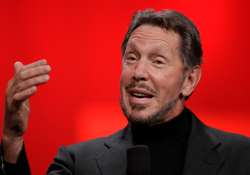Oracle cuts salary of CEO, key execs
Redwood City: The value of Oracle founder and CEO Larry Ellison's pay package dropped 18% in fiscal 2013, to $78.4 million, after the business software company missed its internal financial targets and he declined his

Redwood City: The value of Oracle founder and CEO Larry Ellison's pay package dropped 18% in fiscal 2013, to $78.4 million, after the business software company missed its internal financial targets and he declined his annual cash bonus.
That's according to a securities filing made on Friday and reviewed by The Associated Press.
Ellison, 69, is one of the highest-paid executives in the US. Forbes magazine ranks him as America's third-richest person with personal wealth of $41 billion.
The biggest chunk of compensation for the year, which ran through May, came in the form of stock options, valued at $76.9 million when they were issued. Ellison also received about $1.5 million worth of benefits, mostly for security. His annual salary is $1.
He voluntarily declined a cash bonus that would have come to about $1.2 million, given "growth that did not meet Oracle's internal expectations," the company said.
Chief financial officer and president Safra Catz's compensation package decreased 16% to $43.6 million, as did president Mark Hurd's pay. Catz and Hurd also voluntarily turned down a cash bonus that would have come to $717,000 apiece.
In the last fiscal year, revenue was nearly unchanged at $37.2 billion, while net income grew 9.5% to $10.9 billion. The stock price rose 28% over the period to $33.78.
The AP formula calculates an executive's total compensation during the last fiscal year by adding salary, bonuses, perks, above-market interest that the company pays on deferred compensation and the estimated value of stock and stock options awarded during the year. The AP formula does not count changes in the present value of pension benefits. That makes the AP total slightly different in most cases from the total reported by companies to the Securities and Exchange Commission.
The value that a company assigned to an executive's stock and option awards for 2012 was the present value of what the company expected the awards to be worth to the executive over time. Companies use one of several formulas to calculate that value. However, the number is just an estimate, and what an executive ultimately receives will depend on the performance of the company's stock in the years after the awards are granted. Most stock compensation programmes require an executive to wait a specified amount of time to receive shares or exercise options.
That's according to a securities filing made on Friday and reviewed by The Associated Press.
Ellison, 69, is one of the highest-paid executives in the US. Forbes magazine ranks him as America's third-richest person with personal wealth of $41 billion.
The biggest chunk of compensation for the year, which ran through May, came in the form of stock options, valued at $76.9 million when they were issued. Ellison also received about $1.5 million worth of benefits, mostly for security. His annual salary is $1.
He voluntarily declined a cash bonus that would have come to about $1.2 million, given "growth that did not meet Oracle's internal expectations," the company said.
Chief financial officer and president Safra Catz's compensation package decreased 16% to $43.6 million, as did president Mark Hurd's pay. Catz and Hurd also voluntarily turned down a cash bonus that would have come to $717,000 apiece.
In the last fiscal year, revenue was nearly unchanged at $37.2 billion, while net income grew 9.5% to $10.9 billion. The stock price rose 28% over the period to $33.78.
The AP formula calculates an executive's total compensation during the last fiscal year by adding salary, bonuses, perks, above-market interest that the company pays on deferred compensation and the estimated value of stock and stock options awarded during the year. The AP formula does not count changes in the present value of pension benefits. That makes the AP total slightly different in most cases from the total reported by companies to the Securities and Exchange Commission.
The value that a company assigned to an executive's stock and option awards for 2012 was the present value of what the company expected the awards to be worth to the executive over time. Companies use one of several formulas to calculate that value. However, the number is just an estimate, and what an executive ultimately receives will depend on the performance of the company's stock in the years after the awards are granted. Most stock compensation programmes require an executive to wait a specified amount of time to receive shares or exercise options.